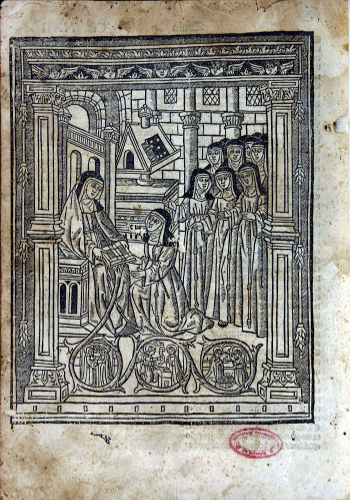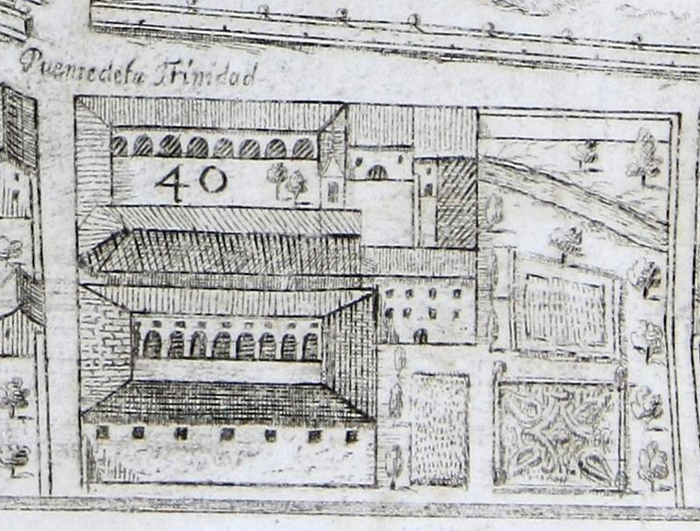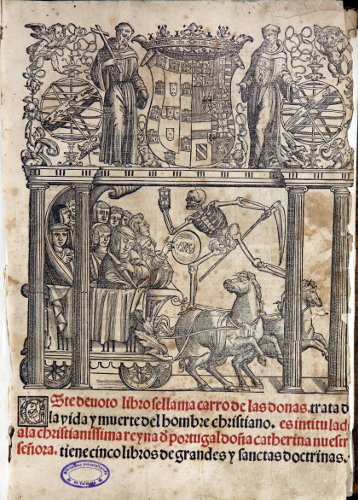 |
|
Isabel de Villena, Vita Christi de la Reuerent Abbadessa Dela Trinitat / nouament historiat, corregit y smenat per vn mestre en sacra theologia, p[er] art e industria d[e] Gorge Costilla, 1513 Fonch empremptat lo p[re]sent libre [en Valencia], Biblioteca Històrica Universitat de València
|
|
Tomàs Agustí Sales i Alcalà, Historia del real monasterio de la SSma. Trinidad, religiosas de Santa Clara, ... / Su autor, Agustín Sales, En Valencia : Por Josef Estevan Dolz ..., 1761, Biblioteca Històrica Universitat de València
|
Sister Isabel de Villena was an intellectual from 15th Century Valencia. This period -known as the Golden Century of Valencian Literature- counted with exceptional works of no others than Ausiàs March, Joanot Martorell, Joan Roís de Corella, Jaume Roig or Bernat Fenollar.
Sister Isabel was an exceptional woman related to the Houses of Aragon and Castile. Her life was closely linked to the Valencian Trinity Monastery, in which she was an abbess for 27 years until she died in 1490 as a consequence of the Valencian Plague. During the time Sister Isabel was in charge, the Monastery became a center of culture and prestige, a special environment for an artistic and intellectual blossoming.
Vita Christi by Isabel de Villena is an indispensable literary work within the Valencian Golden Century. It has proved worthy of being acknowledged as the first writer in Valencian language and the best Medieval writer in Spanish. She is also considered as a woman ahead of her time, precursor of feminist ideas and who had the ability of expressing herself with an exquisite subtlety. In her text, she defends the dignity of women against the worst medieval misogyny clichés such as those represented by Jaume Roig in his work Espill o Llibre de les dones (Mirror or Women’s book) in which a woman’s figure is defined as “the gate of hell” (janua inferi), an adequate lineage to deceive men, a lust monster and an anthology of abominations.
 |
|
Tomás Vicente Tosca y Masó. Plànol de la ciutat de València, 1704
|
The Acadèmia Valencia de la Llengua (Academy of Valencian Language) dedicates the year 2016 to the figure of Sister Isabel de Villena and, in cooperation with the Universitat de València, holds and exhibition at one of the most emblematic galleries of the Cultural Centre La Nau, the Sala Duque de Calabria. The exhibition invites us to contemplate a selection of documents of an outstanding value that are safeguarded at the Biblioteca Histórica de la Universitat (University Historical Library).
Among the displayed pieces, Francesc Eiximenis’ work Carro de las Donas is included. Eiximenis’ works exerted great influence on subsequent writers, being a referent until the 16th Century when Juan Luis Vives wrote De insitutione Feminae Christiana.
Sister Isabel’s Vita Christi was posthumously published and it achieved even more editorial success than Tirant lo Blanc did. The first printed editions of this literary treasure are displayed at the exhibition. Sister Isabel’s text, characterized by its plasticity and for assimilating the old apocryphal tradition enriched with meditative techniques, serves as an undisputed help when interpreting the content and the message of many religious works that can be seen today in churches and museums.
Among the pieces in the exhibition we can find: Vita Christi by Francesc Eiximenis, Obres de Ausias March, Obres de mosen Corella (Cançoner de Maians), Meditationes Vitae Christi (Lo quart del Cartoxà) by Ludolphus de Saxonia or the Arbor vitae crucifixae Jesucristi by Ubertino da Casale.
The legacy of Sister Isabel de Villena synthesizes the existing interweaving of Christianity and our peoples at the same time that it captures the richness of Valencian culture’s vernacular language. Hence, she deserves for society to acknowledge her inestimable merits and value.
 |
|
Francesc Eiximenis, Este deuoto libro se llama carro de las donas : trata de la vida y muerte del hombre christiano / [Francesc Eiximenis], por industria de Juan de Villaquiran, 1542 Valladolid. Biblioteca Històrica Universitat de València
|











